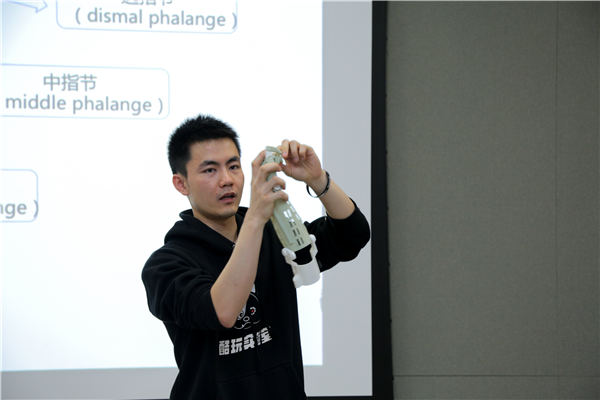A hands on enterprise


China is home to 2.46 million children between the ages of 6 and 14 who live with disabilities, including 480,000 who have limb disabilities, according to China's Second National Sample Survey on Disability.
Indeed, 3D printing may prove a dramatic shift for the group.
"We always wanted a prosthesis for my son," says Jingtian's mother, Liu Lizhao, "but the traditional kind costs too much."
Liu, who works as a journalist in Beijing, could afford to buy one, but her son has continued to grow quickly, meaning each of his prosthetics would soon become obsolete.
"So, we decided to give Hands On a try when we heard about it in 2016," she says.
Su designed the model based on the boy's information.
Jingtian held a cup with his left hand for the first time in his life about two months after he received his prosthetic.
"The 3D-printed hand assists my son with many daily activities and helps build his left arm's muscles," Liu says.
"It gives us hope that his disability can be entirely overcome someday, as the technology improves."
The 3D-printed hands are relatively cheap, but Hands On still struggles to cover costs.
Expanding outreach
The members ask charities for funds and also earn money by organizing corporate-volunteering workshops.
Hands On believes its team-building workshops on 3D-printed prostheses not only enable participants to act on social responsibilities but also raise public awareness about disabilities.
Equally, workshop participants have improved Hands On's products through useful suggestions.
"We have long-term cooperation with many big companies, such as Johnson & Johnson, Microsoft and Bayer," Zhang says.
Mao Qingge, senior director of consumer products at Johnson & Johnson's Asia-Pacific Innovation Center, says: "Our workshop with Hands On is a social innovation, focused on welfare and philanthropy.
"We hope our professional technicians can put their experience, ability and knowledge to work for a philanthropic cause and become volunteers, who donate not only time but also provide professional skills and technology."
In 2017, Hands On began to cooperate with the Award Scheme Development and Accreditation Network, a UK-based curriculum-development organization and awarding body, to provide education programs for Chinese high school students who are interested in technology.
Yuan Yichan, CEO of ASDAN's China branch, speaks highly of its cooperation with Hands On, saying the program gives students an opportunity to solve social problems.
Students in the program form groups of three to five. They take online courses about 3D printing and then join a weeklong camp to make 3D-printed hands.
"Students learn a lot, even if not all the prostheses they make can be used," Yuan says.
"About 10 percent of the students have gone on to found 3D-printing clubs at their schools."
About 200 kids have completed the program.
Fifty-five children from around China joined the fourth training session in Beijing in August and ASDAN has already started its fifth round of recruitment.
Also in August, Hands On won the coveted Asia-Pacific Youth Sustainable Development Goal Entrepreneurship Award at the Asia-Pacific Forum on Youth Leadership, Innovation and Entrepreneurship organized by the United Nations Development Programme.
It was one of eight winning teams, all of which are youth-led enterprises addressing social issues, says Beniam Gebrezghi, regional civil society and youth adviser with the UNDP Bangkok Regional Hub.




































